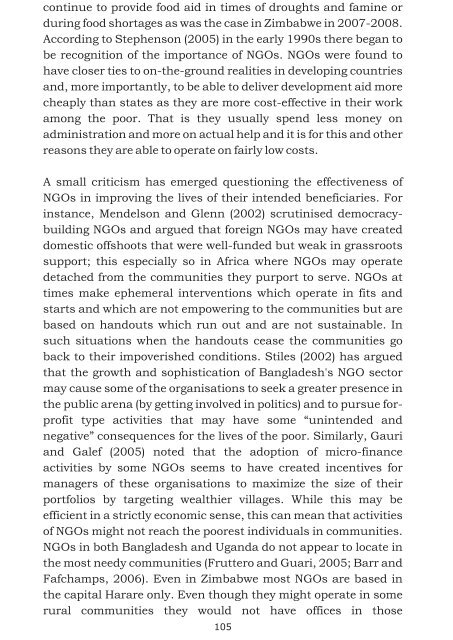Beneficiaries are actors too.pdf - Southern Institute of Peace ...
Beneficiaries are actors too.pdf - Southern Institute of Peace ...
Beneficiaries are actors too.pdf - Southern Institute of Peace ...
Create successful ePaper yourself
Turn your PDF publications into a flip-book with our unique Google optimized e-Paper software.
continue to provide food aid in times <strong>of</strong> droughts and famine or<br />
during food shortages as was the case in Zimbabwe in 2007-2008.<br />
According to Stephenson (2005) in the early 1990s there began to<br />
be recognition <strong>of</strong> the importance <strong>of</strong> NGOs. NGOs were found to<br />
have closer ties to on-the-ground realities in developing countries<br />
and, more importantly, to be able to deliver development aid more<br />
cheaply than states as they <strong>are</strong> more cost-effective in their work<br />
among the poor. That is they usually spend less money on<br />
administration and more on actual help and it is for this and other<br />
reasons they <strong>are</strong> able to operate on fairly low costs.<br />
A small criticism has emerged questioning the effectiveness <strong>of</strong><br />
NGOs in improving the lives <strong>of</strong> their intended beneficiaries. For<br />
instance, Mendelson and Glenn (2002) scrutinised democracybuilding<br />
NGOs and argued that foreign NGOs may have created<br />
domestic <strong>of</strong>fshoots that were well-funded but weak in grassroots<br />
support; this especially so in Africa where NGOs may operate<br />
detached from the communities they purport to serve. NGOs at<br />
times make ephemeral interventions which operate in fits and<br />
starts and which <strong>are</strong> not empowering to the communities but <strong>are</strong><br />
based on handouts which run out and <strong>are</strong> not sustainable. In<br />
such situations when the handouts cease the communities go<br />
back to their impoverished conditions. Stiles (2002) has argued<br />
that the growth and sophistication <strong>of</strong> Bangladesh's NGO sector<br />
may cause some <strong>of</strong> the organisations to seek a greater presence in<br />
the public <strong>are</strong>na (by getting involved in politics) and to pursue forpr<strong>of</strong>it<br />
type activities that may have some “unintended and<br />
negative” consequences for the lives <strong>of</strong> the poor. Similarly, Gauri<br />
and Galef (2005) noted that the adoption <strong>of</strong> micro-finance<br />
activities by some NGOs seems to have created incentives for<br />
managers <strong>of</strong> these organisations to maximize the size <strong>of</strong> their<br />
portfolios by targeting wealthier villages. While this may be<br />
efficient in a strictly economic sense, this can mean that activities<br />
<strong>of</strong> NGOs might not reach the poorest individuals in communities.<br />
NGOs in both Bangladesh and Uganda do not appear to locate in<br />
the most needy communities (Fruttero and Guari, 2005; Barr and<br />
Fafchamps, 2006). Even in Zimbabwe most NGOs <strong>are</strong> based in<br />
the capital Har<strong>are</strong> only. Even though they might operate in some<br />
rural communities they would not have <strong>of</strong>fices in those<br />
105


